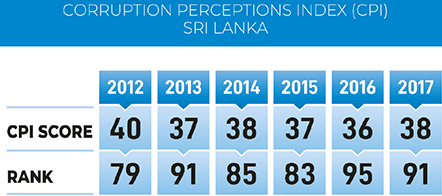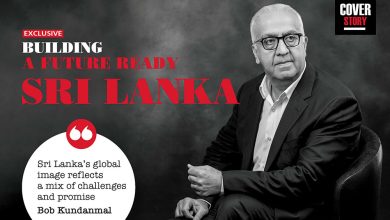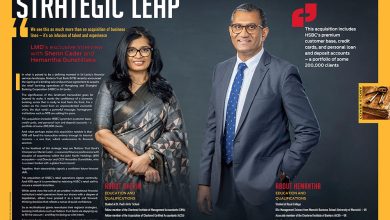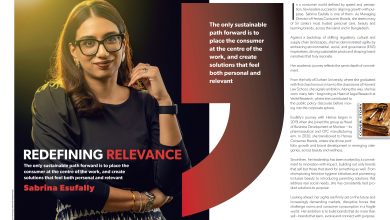COVER STORY
PREVENTION IS BETTER THAN DETECTION
Neville Guruge steadfastly believes that prevention is better than cure when it comes to combatting bribery and corruption
The Commission to Investigate Allegations of Bribery or Corruption (CIABOC) was established by Act No. 19 of 1994 with the enactment of the 17th Amendment to the Constitution of Sri Lanka. In its present form, CIABOC is a statutory body that operates independently to combat bribery, corruption, and accumulation and non-declaration of assets.
CIABOC Act No. 19 of 1994 states that the commission “shall consist of three members; two of them shall be retired judges of the Supreme Court or of the Court of Appeal and one of whom shall be a person with wide experience relating to the investigation of crime and law enforcement.”
All the commissioners have equal powers – and all the investigations and prosecutions are initiated only on the directions of the commissioners. The Director General (DG) of the Commission is appointed by the president in consultation with the commissioners. The present DG is Sarath Jayamanne PC.
Alongside retired judges Justice T. B. Weerasuriya (Chairman) and Justice Lal Ranjith Silva, Neville Guruge occupies the position of Commissioner of CIABOC. Prior to this appointment, Guruge held the post of Director Investigations from 2005 to 2009 where he gained experience in eradicating corruption, having joined the police force as a sub-inspector in 1974 and retired as a Senior Superintendent of Police in 2009.
In this exclusive interview with LMD for its 24th anniversary edition, he highlights the scale of corruption in the island and outlines plans for arresting the negative trend while maintaining a special focus on prevention – which he cited as his professional forte.
– LMD
Q: In your opinion, what is at the root of widespread corruption in the world today?
A: Today, people are running behind money, and have let go of all norms and values. That is the main problem we face.Based on my experience as a former police officer rather than my tenure at the commission, I have always believed that a person is led to commit a crime and resort to bribery or corruption because of a particular mindset. The root cause of human behaviour lies there.
This is a concept common to all religions. In my view, the prevention of crime lies there. It is certainly better if we could prevent people from committing crimes rather than punishing them after the event.
Implementing the law or deterrent action could also be treated as part of prevention. For example, if we could implement capital punishment for murder, we could in theory prevent many crimes from taking place – criminals may not commit crimes through fear of facing the possibility of execution.
But that’s not enough. If we could prevent a person from committing an offence, I believe that it would be a great achievement. That is what we need with regard to bribery and corruption too. If we can prevent a person from committing an offence related to corruption, our goal would have been achieved.
Public servants may come from respectable backgrounds but there is something lacking. They may be educated but their minds may not be refined. That is the problem. Some of them have the weakness of soliciting bribes or using public funds for personal benefit. They have the tendency to be involved in corrupt activities.
I conducted research to uncover the root causes of this situation and found that people tend to take others’ money because their minds are not purified or trained properly. They are full of expectation, anxieties, lust and delusions, and not satisfied with what they have. Naturally, untrained or uncultured minds are elusive and can be persuaded to commit evil – they become slaves to their senses.

Imagination and emotions always mislead a person if his or her mind is not properly trained. To overcome this situation, it is necessary to purify the mind.
People try to overcome their miseries through pleasing the senses. They need money to spend for such activities. When their legally earned income isn’t adequate to spend on these activities, they tend to earn illegally and become corrupt persons.
Public servants may also fall into this category, and accept bribes and obtain public funds by way of corruption. The real way to relax is to calm the senses. When the mind is fully controlled and purified, it will be free from mental disturbances and can perceive many things that others cannot see with the naked eye.
Today, we need to find methods to fulfil this task.
Q: Is it possible to pin down the cost of bribery and corruption in Sri Lanka?
A: This is a widespread problem and the entire government sector has been affected by this issue. Yet, when you consider the entire public sector workforce, only 15 to 20 percent are corrupt.
Almost 80 percent of government servants are honest people. Sometimes, they may turn a blind eye to the corruption that is happening around them because they are cornered and the corrupt individuals dominate the institutions. The head of an institution must ensure better supervision but this is not the case at present. It is the lower rank personnel who tend to deal with the public. So supervision is very weak in our system.
Bribery and corruption hinders the development process of our country – it causes inflation and increases the cost of living, promotes personal benefits at the cost of public welfare, creates discrimination in society, hinders the opportunities of developing society, denies democratic rights and leads towards dictatorship, and negates good living conditions such as fundamental rights, food, shelter, health, education and administration of justice.
So it is subject to the criticism and condemnation of the international community.
Q: What are the key trends when it comes to bribery and corruption – i.e. in terms of scale and rate of incidence?
A: The level of corruption is increasing. We’re trying to minimise this through changing attitudes and giving preference to the prevention aspect as observed in many developed countries. We are looking to amend the law and gain further provisions to this end.
At the moment, we don’t even have an official prevention unit to eradicate corruption in Sri Lanka. Currently, there are about 3,000 cases of bribery or corruption pending.
 Q: In addressing a workshop in Galle to create awareness regarding the National Action Plan to combat bribery and corruption in Sri Lanka not long ago, you said that “many investors who came to Sri Lanka refused to offer bribes and invested in ventures in other countries…” Could you elaborate on this?
Q: In addressing a workshop in Galle to create awareness regarding the National Action Plan to combat bribery and corruption in Sri Lanka not long ago, you said that “many investors who came to Sri Lanka refused to offer bribes and invested in ventures in other countries…” Could you elaborate on this?
A: This is a major problem for us and our country’s development is hindered on account of it.
We want to change the culture of corruption that exists and for this we have to change the attitudes of the people. Even the general public may not be aware of what is happening to their funds because corruption is concealed whereas bribery is out in the open.
Q: So how can businesses play a role in combatting the scourge of corruption?
A: There is bribery and corruption taking place in the private sector, which directly or indirectly hinders the development of the country.
The private sector tends to induce the government sector to engage in bribery and corruption. There is also the practice of private sector institutions offering gifts to state institutions, which should not happen. For instance, Bhutan has a separate law against accepting of such presents.
Therefore, on the request of civil society as well, we have suggested amending the law to encompass the private sector in due course.
Q: Do you believe that civil society is doing its part to highlight corrupt people?
A: We are educating the public to act as whistleblowers and raise their voice against corruption – this is an area that is lacking in the country. The majority of the population chooses to remain silent in the face of those who are committing corrupt acts. There is a Protection of Victims of Crime and Witnesses Act whereby we can provide protection to complainants and witnesses.
Previously, we didn’t have a National Action Plan to eradicate bribery and corruption. At present however, we have the political will to achieve this and a National Action Plan has been entrusted to the commission for implementation. We have organised seminars for government servants as well as civil society, obtaining their ideas on how to implement the National Action Plan.
Moreover, we have appointed a National Coordinator for the action plan who deals with an International Coordinator to study the action plans of other countries and prepare our own.
Together with the Ministry of Education, we are promoting the setting up of ‘integrity clubs’ within schools. But only about 35 schools in the country have responded to the programme as the principals do not seem keen on it. We have entrusted the responsibility of getting schools on board with the programme with the Zonal Directors.
Q: Are law enforcement authorities able to carry out duties with due care – especially with some coming under the purview of errant politicians?
A: Speaking on behalf of our commission as an independent institution, I can say we do not come under the influence of anybody whether they be politicians or otherwise. Nobody can interfere in our work and that has been the case since our appointment in October 2015.
Q: What are the main accountability mechanisms in place with respect to curbing corruption?
A: We have given priority to prevention. Apart from that, we conduct awareness programmes for government servants as well as the general public to change their attitudes, and act as whistleblowers to eradicate corruption.
Depending on the cases, we have provisions to arrest those who are not part of the public sector if they’re found to be party to a government activity or funds – for example, if a bribe is accepted through a third party.
Q: Could you describe the rationale for new laws on the disclosure of conflicts of interest and relationships?
A: Conflict of interest is an important area for which we don’t have provisions at present. Of course, nepotism is considered an aspect of corruption. We have studied countries such as Hong Kong and Bhutan for this purpose.
Q: More recently, the radar has fallen on campaign financing and how it can lead to corrupt practices. What are your views on this?
A: This is where the corruption begins and it should be stopped. In this respect as well, we have incorporated certain suggestions made by civil society into the National Action Plan.
We will also amend the law related to the non-declaration of assets by including an increase of the penalty from Rs. 1,000 to 100,000 rupees and providing online access to the disclosure forms.
Q: What other legislative amendments are required for the authorities to function in a more effective way vis-à-vis stemming corruption?
A: From the very inception of the present commission, we have wanted to have a separate courthouse to hear cases. And the relevant bill has been passed by parliament.
People are reluctant to make complaints as the Commission is based in Colombo, which is where the filing of action also takes place. The jurisdiction does not apply to other areas of the island. Therefore, it is vital to decentralise the commission albeit that this will entail a lengthy process.
Q: Does the likes of the Bribery Commission have the requisite manpower to conduct thorough investigations?
A: We are short of people. The investigations are conducted by police officers obtained from the Police Department, and we expect the Inspector General of Police (IGP) to provide officers who possess high integrity and honesty. But other law enforcement bodies also require such individuals who are few and far between in the present context.
So we have decided to recruit from outside, and have already gazetted the recruitment of 200 investigators and 50 integrity officers to the commission. They should be graduates and will be vetted by the State Intelligence Service (SIS). We need individuals with integrity and a good reputation.
Our integrity officers will be deployed at institutions to gain information for the commission, subsequently advising them on how to rectify any weaknesses within the said institutions.
We’re also looking to gain expertise for the investigation division in the form of professionals such as accountants, engineers, and valuation and forensic specialists.
 Q: How can Sri Lankan agencies tie up with global entities in their effort to fight corruption?
Q: How can Sri Lankan agencies tie up with global entities in their effort to fight corruption?
A: Sri Lanka is party to the United Nations Convention against Corruption (UNCAC), having signed up on 15 March 2004 and ratified on 31 March 2004. The convention entered into force in Sri Lanka on 14 December 2005.
Our legal officers and investigators are also deployed for overseas training in countries such as Hong Kong, India, Malaysia and Singapore.
Q: What do you envision in the context of curbing corruption in Sri Lanka – is the playing field likely to even out sooner rather than later?
A: We cannot do anything without the political will. The present political hierarchy is against corruption, which is a positive indicator. The commission has also received greater powers through the 19th Amendment whereby we can launch investigations on our own initiative.
So with the implementation of the National Action Plan as well, there is potential for Sri Lanka to become a corruption free country in the future.
Nevertheless, we have to act on many fronts to change people’s attitudes and overturn the culture of corruption.
Q: And finally, how would you react to those among us who lament the fact that the ordinary citizen is expected to abide by the law while many among those who enact our laws are allegedly corrupt?
A: There is no question that the law applies to all.
– Interviewed by Zulfath Saheed and Anushan Selvarajah














Thank you for the timely article.
Yes, even the commissioner will find it difficult to do something useful, given the system that operates as a free market now. Commissions, tips and lobbying are all legal in the USA. And business organisations come fourth in the list of lobbying organisations. Securities and investments, and all the other companies that LMD has to write about simply spend money on lobbying (https://www.opensecrets.org/lobby/top.php?indexType=i&showYear=2018).
We don’t know much about lobbying in Sri Lanka. We’ve only heard of the bond scam, the MiG deal and the China funds. Moreover, they use commissions legitimately in order to influence clients and customers via intermediaries.
And tipping is a legitimate payment that balances off the little salary that most workers in many service industries get, tourism being a notable example. So if you are procuring something and given a large sum of money as your commission, you are not doing something wrong. This system is fostered and maintained by the private sector in order to deliberately manipulate the market, pay low wages and get through the legal frameworks when it comes to control measures.
For example, the budget for advertising has not reduced a single cent even after the banning of advertising in industries such as tobacco and alcohol. They are using it for lobbying. The insurance company will pay the commission only to the agent, not to its client. This built-in system of corruption is a must-have for the survival of the system that we admire.
The sad thing is that the so called ‘left’ and liberation movements fully endorse all these. May the commissioner have the strength and serenity to do something productive.
BalaN
A great article and interview – and a very dedicated commissioner! Hopefully, constantly having the issue of bribery and corruption talked and written about, and highlighting ways in which each and every person who is willing can play a part in assisting with educating people on this will make a difference to reduce this in some small way.
Congratulations to you and your commissioners for the efforts taken to eradicate bribery and corruption. People are waiting for you to take quick actions against top errant politicians. Hope that will help you control bribery and corruption in Sri Lanka to a certain extent, and wish you all success.